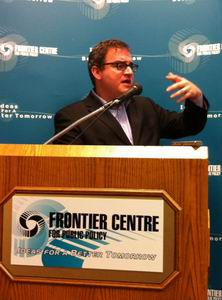Frontier Centre: What was the genesis of this book? Was there an event or a point where suddenly it became clear that you had to write it?
Ezra Levant: I was actually promoting my last book Shakedown which was about freedom of speech at the Ottawa Writers Festival last year and I was out there with some time to kill beforehand and they said there’s a fellow downstairs talking about the oil sands, you’re from Alberta that makes you as close to an expert as me go and make it a panel discussion. So I went downstairs and it was in this room that was adorned with all these big photos of the oil sands and open pit mines. I call it oil sands pornography. There were a hundred hostile people in the room and this anti-Alberta author and me. For the next 90 minutes I sort of got beat up about the oil sands and I didn’t really defend myself very well because frankly, I was arguing in a right-wing, conservative, property rights, climate skeptic way. After that experience I thought about it and those people in the room were not malicious or hostile they were actually the opposite. They were do-gooders. These were not Greenpeace fundraisers or lobbyists these were just concerned people. The problem was I wasn’t talking in a way that connected with them so I thought about and I decided I was going to write a liberal defense for the oil sands and that’s what I did.
FC: What are the four liberal values you sought to appeal to in the book?
EL: I think they’re genuine liberal values. They are not caricatures or straw men. They are environmental responsibility, peace, a fair wage for the working man and human rights. Those are four legitimate values that make up the liberal or progressive world view. Using those liberal yard sticks comparing the oil sands against every other oil exporter in the world I think you have to come to the conclusion that Canadian oil sands oil is the most ethical in the world.
FC: Do you need to be a climate change skeptic to agree with this book?
EL: Not at all. That’s what I mean about talking to Liberals on their own terms. I am a climate change skeptic, I’ve even written a whole book about it called Fight Kyoto, but you don’t need to be because oil sands oil has a lower carbon footprint per barrel than a lot of other oil that the U.S. imports from Venezuela and even American oil from California which is called California Heavy it’s so carbon intensive. The argument would be that we should replace higher carbon fuels in the states like Venezuela imports and California oil with lower carbon oil sands oil. So even a global warming worrier can agree with that.
FC: Why do groups such as Greenpeace choose to target the oil sands in spite of the considerations you raise in your book?
EL: I think there are three reasons that Greenpeace targets the oil sands. First of all, it’s safe. If you were to target the oil production in Saudi Arabia, Iran, Venezuela, Sudan, Russia or Nigeria you would probably be killed. If you broke into a refinery there like they did in Canada you would be killed. That’s the first thing it’s safe and easy. The second is it makes a lot of money for them. Because the oil sands are open and transparent and you can look at them and people talk about them they are a great fundraising tool for Greenpeace. That leads to my third reason which is that they’re esthetically ugly. Those open pit mines, even though they’re only a fraction of the oil sands are developable using open pit mines, are ugly and so that is their chief political flaw is they’re not pretty to look at. I think the main reason is cowardice. Greenpeace won’t go after the badly behaved countries precisely because they’re badly behaved. They go after the world’s most gentle country precisely because we are gentle.
FC: Can you see the taking of such an inconsistent position damaging Greenpeace in Canada or in the developing world?
EL: Greenpeace doesn’t care about its reputation in the developing world. It’s really not active in the developing world. Measured by where they’re memberships and income comes from it is basically a European and North American company. I say company because it is a trans-national corporation based in Europe with annual revenues of about $250 million. If they don’t raise $1 million a day every weekday they are out of business. They are actively fundraising in China. That is the one third-world country where they are active in fundraising but in return they do not criticize the Chinese government. I don’t think Greenpeace cares about its reputation as much as it cares about its money.
FC: What sort of reception have you had when taking the book on tour to universities over the past several months?
EL: Professional activists will obviously never be persuaded no matter what the arguments are. I have debated no less than five different Greenpeace lobbyists and they refused to state obvious things such as the way we conduct our business in Canada is morally superior to Saudi Arabia. They won’t make that obvious concession even though they look ridiculous denying it because if they were to say Canadian oil is morally superior to Saudi oil certain things would flow from that like the fact that America should buy more oil sands oil and not Saudi oil and they don’t want to acknowledge that. With people who are not paid professionals I have had some luck. True Liberals if I appeal to their values honestly and hold them to their own standards a lot of them will come around. Even if they don’t become cheering champions of the oil sands they will at least moderate or modify their criticisms a bit.
FC: How do you respond to the suggestion that you’re on the take from the oil industry?
EL: I respond by telling them who actually is paying me for the book and it’s a literary publisher out of Toronto called McClelland and Stuart. They paid me a $40,000 advance for the book which was enough to keep me going as I wrote it and now I’m running royalties against that. I didn’t even talk to oil companies when I wrote the book. What would be the point? They haven’t been effective in making their own case. I did my own research for the book for example calculating the amount of blood per barrel in Sudanese oil. You’re not going to get that information out there you have to find it yourself. It’s funny because what I discovered along the way is that while I was working for my publisher and doing it as an independent journalist so many environmental journalists themselves are on the take. For example as I prove in the book Andrew Nikiforuk who is a journalist and an author himself actually took money from Greenpeace at the same time and didn’t disclose that when he presents himself as a journalist. I think I’m an anomaly in that I’m the only guy who wrote a book for its own sake. I’m not on the payroll of Greenpeace like Nikiforuk and others.
FC: Why do you think the industry has been so ineffective at defending their own story?
EL: I think for years they didn’t have to defend it because conventional oil and gas didn’t get a lot of protest. The oil sands are a fairly new phenomenon although they’ve been in experimental stages for decades it’s only been in the last five years that they’ve really been large and had large international attention. It’s a new thing being attacked and they are not used to it. I think that is hard for some oil companies to fight back hard because they have so many stakeholders and they have to moderate so they want to be the good cop but there is no bad cop in the industry. Buzz Hargrove was a champion for the auto sector and he’d take on anyone as tough as he could beat. There is no Buzz Hargrove in the oil industry you have a bunch of risk-averse CEOs with boards and risk management approach to things. Finally, the attacks on them are by extremely well-funded foreign lobbyists not just Greenpeace but groups like the U.S. Tides Foundation that have poured in $190 million in the last ten years of foreign money.
FC: What’s their (The Tides Foundation) stake in this?
EL: They are an ideologically driven group of people who are against capitalism, against energy development so they are driven by ideology. Groups like Greenpeace it’s one part ideology and one part fundraising.
FC: Okay let’s switch over to another topic. What is the case for getting rid of Human Rights Commissions?
EL: Human Rights Commissions serve no purpose. Real courts already handle wrongful dismissal matters, landlord and tenant matters. If you fire someone because they’re black, if you kick someone out of their apartment because they’re Aboriginal we already have real courts that will deal with that fairly and quickly so they’re redundant. What they do do is they go after fake crimes, hurt feelings, the counterfeit right not to be offended and they become this grievance industry that exists for its own sake. So not only do we not need them to do any good but they’re actually doing bad things that we should shut down.
FC: Do you have any thoughts on the Saskatchewan government’s move to abolish the Human Rights Commission there?
EL: I think it’s a good first step because it will get rid of that whole kangaroo court with all the bizarre processes. I’m still not happy that the laws exist even though they’re going to be implemented by real courts it’s an improvement but the Saskatchewan law contains a censorship provision. I don’t want even the finest judges in the land enforcing a censorship law. Yes it’s an improvement because some of the kangaroo court aspects are removed but I don’t want even the fairest court in the land empowered to be a censor. I don’t believe in censorship or the right not to be offended at all but it is a step forward and I congratulate Saskatchewan to be the first Canadian jurisdiction to take this stand.
FC: Why is the Harper government going so slow on Human Rights Commission reform?
EL: Because they’re afraid of being branded anti-human rights or anti-minority and that’s really the only strength the Human Rights Commissions has which is a lie they are not human rights commissions they’re actually human rights destroyers. They are destroying our freedom of speech which is a real human right. They’re destroying our freedom of religion and our property rights in the name of this counterfeit human right not to be offended. I think the conservative government with its minority position in Parliament is afraid that the opposition would brand them as anti-minority or anti-human rights. I think that’s a mistake. I think not only do the vast majority of minorities in Canada either don’t care about this law or oppose it but I think it would actually create a division in opposition benches. I think the Conservative party would be united for free speech and about half of Liberals would be united too, the true Liberals. It would create a problem for the opposition if anything. Where would Michael Ignatieff stand? Historically he’s been on the side of free speech so if anything I think it will be a great wedge issue for the Conservatives to use against the Liberals. It would also give the Conservatives bona fidance with groups that traditionally don’t support them like artistic groups, editorial boards, people who love free speech would congratulate the Conservatives which they don’t usually do.
Read in PDF format here. (2 pages)



